Outlaw bikie gangs: The fight against the Rebels, Mongols, Hells Angels in Australia
IT is Australia’s largest bikie gang, behind murders, drug rings and extortion. So how do we stop bikie gangs like the Rebels? Immigration Minister Peter Dutton reveals the strategy.
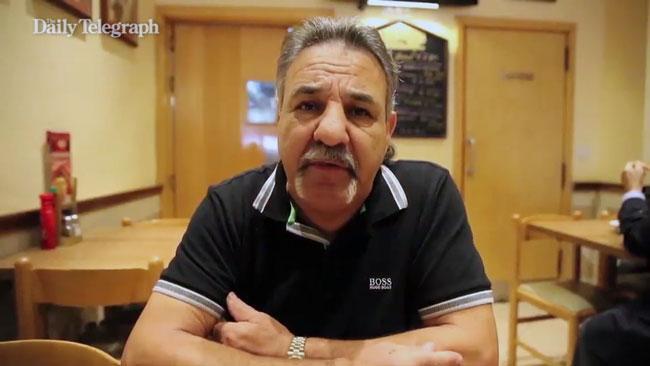
Law & Order
Don't miss out on the headlines from Law & Order. Followed categories will be added to My News.
IMMIGRATION Minister Peter Dutton has a name for what the authorities are doing to smash the power of outlaw bikie groups.
He calls it “cutting the head off the snake.’’
The Federal Government has set out to systematically destroy outlaw motorcycle clubs in Australia, and have focused heavily on the Rebels, the group founded by the Maltese-born Alex Vella more than 40 years ago.
It is Australia’s largest bikie gang, with more than 1100 members and 900 associates. It is responsible for a string of murders, extortion and shootings, and runs major drug and weapon-smuggling rings.
The plan to take on the Rebels was military-like — it involved taking out its leadership.
So new laws were used to ban Vella, the so-called “Maltese Falcon’’ from Australia, with his residency rights stripped while he was holidaying in Malta in 2014.
Authorities say that the Rebels have since been beset by leadership and internal power struggles which have weakened their criminal empire and caused members to “patch-out’’, or join rival clubs.
The man earmarked to take over from Vella, Rebels Serjeant-at-Arms Simon Rasic, died from natural causes shortly after Vella was exiled.
The club has apparently not yet settled on a new leader.
“Part of our strategy is cutting the head off the snake,’’ Dutton told the Herald Sun.
“It creates a great vacuum and creates friction and that’s a perfect strategy for disruption.
“Those who are involved in serious crime are being made the highest priority.
“Intelligence agencies prioritise the targets and deliberately they’ve gone for the leaders of the outlaw motorcycle gangs.’’
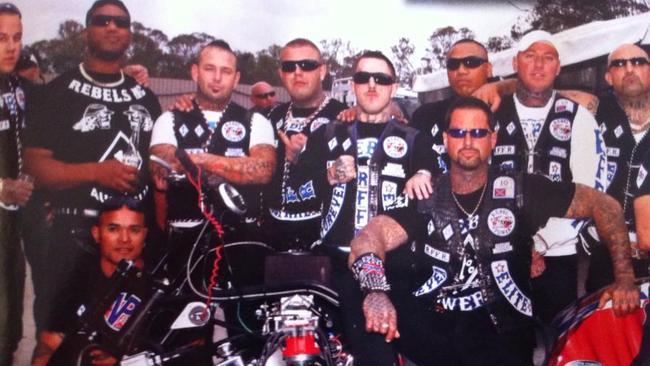

Justice Minister Michael Keenan said the Coalition was alarmed by how entrenched bikies had become, and the Coalition made them a law enforcement priority after coming to Government in September 2013.
“We knew we had a problem on our hands because of the massive bikie brawl on the Gold Coast just prior to the election,’’ he said.
“They were brawling in broad daylight in front of mums and dads and kids. It was terrifying and it was enough. We knew we had to do something.’’
The Australian Gangs Intelligence Co-ordination Centre was opened in Canberra in December 2013, co-located with the Australian Crime Commission.
Crime-fighters from six major agencies — the Crime Commission, Australian Federal Police, Australian Border Force, Australian Taxation Office and Department of Human Services — were brought in to work together to get a laser-sharp intelligence picture of Australia’s outlaw bikies.
The National Gangs List was created — a detailed intelligence file on every bikie members in Australia, and their associates, including lawyers and accounts.
There are 4500 bikies on the list, along with 2500 of their associates, and 900 prospects, or bikies on probation.
Justice Minister Michael Keenan said the aim of creating the big intelligence file was to find a way for law enforcement officials to target the bikies and shut them down.
“We plan to make their lives as miserable as possible,’’ he said.
“The idea is to find out what their vulnerabilities are. How can we get them? Can we get them through their tax? Can we get them through immigration?
“If they forget to do their tax, if they’re driving a Lamborghini but they’re telling the ATO they earned $20,000 last year.
“We use the Department of Human Services. They always seemed to be on welfare.
“Everyone knows they are crooks. They’ve been the face of public crime for years. It sends all the wrong messages.’’
Immigration has proven to be a particularly valuable weapon in the Government’s arsenal.
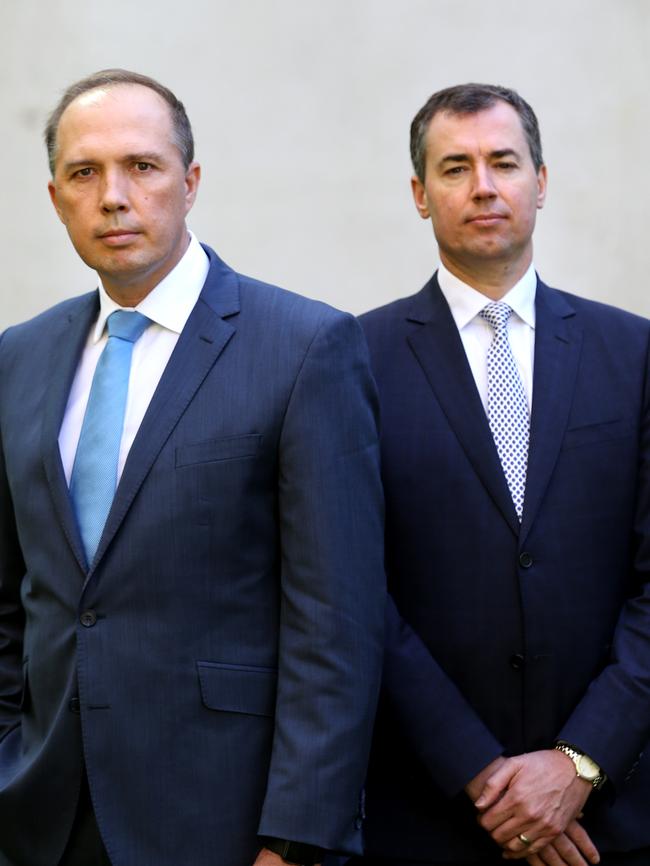
THE briefcase is double-sized, securely locked, and has been passed, hand-to-hand, from the law enforcement agencies to the Immigration Department’s public servants, on to the departmental lawyers, then to Dutton’s desk.
Inside it contains a thick paper file, held in a white ring-bound folder, which contains all the details of the life and crimes of a foreign-born bikie. It has been compiled by the law enforcement agencies.
His family members — partner, children, siblings. His associates — their names and occupations.
The names of his lawyer and his accountant. His travel record, and his current whereabouts. His police record, if he has one (and they almost always do).
Dutton will read the file, make a decision on whether to cancel their visa.
His decision will take into account such things as the target’s personal circumstances.
“Like, Australian-born children, illness in the family, any exceptional circumstances. It paints a picture of the whole family,’’ Dutton said.
Then, once he has weighed the personal circumstances up against the risk he believes the person poses, he will pick up a pen and ink his signature on a document which will strip away that bikie’s ability to remain in Australia.
The file will be locked back in the briefcase, and be passed hand-to-hand back through the lawyers, the public servants, intelligence agencies, then to the Australian Border Force.
If the bikies is overseas, his visa will be cancelled, and he will be advised that he is not permitted back into Australia.
If he is on Australian soil, he will be detained by Border Force officers, usually with the help of state police, taken into custody, and deported.
Dutton said law changes introduced by the Government means those who fail character tests can lose their residency status. Those who are commit serious crimes and are sentenced to more than a year’s jail face mandatory cancellation of their visas.
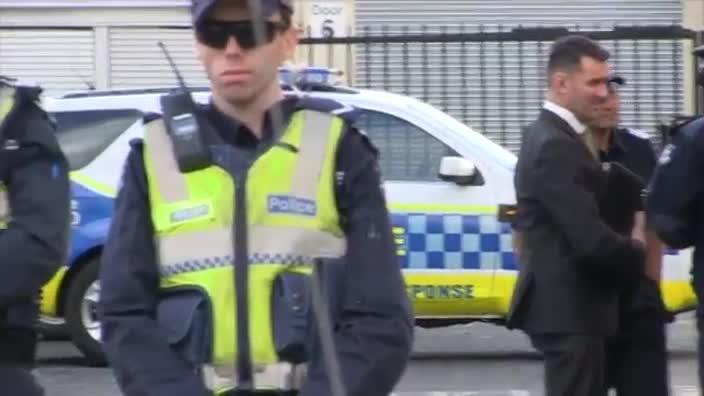
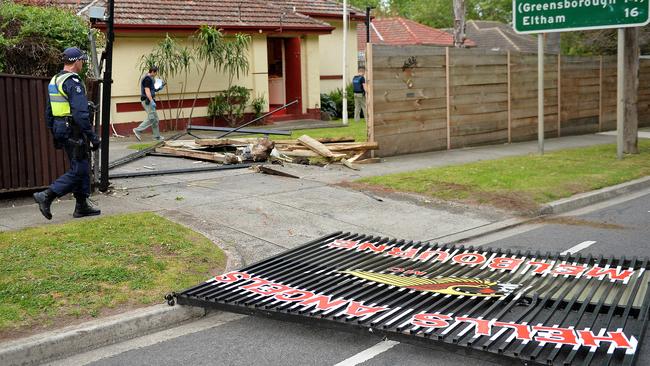
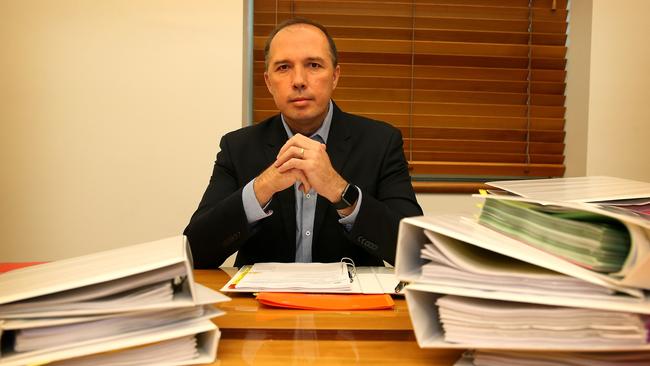
It’s called a “501 cancellation’’ - those who have had their residency status cancelled after failing section 501 of the Migration Act 1958 on character grounds.
Bikies don’t have to have a criminal record. They just have to be of sufficiently bad character for the minister to decide Australia doesn’t want you anymore.
Dutton says 25 members of the Rebels have been booted out of Australia so far, along with 20 members of the Comancheros, and 11 Bandidos.
Other groups including the Mongols, Hells Angels, Nomads, Odins Warriors, Black Uhlans, Finks, Gypsy Jokers, Rock Machine, Lone Wolf and Notorious have had members exiled.
Last financial year, 580 people who failed the character test had their residency visas cancelled, while another 777 have been exiled this financial year, Of those told to get out of Australia this year, 723 were men, and 54 were female.
Over the period of two years, 93 bikies lost their residency status.
As of mid-April, 428 foreigners ordered to leave were in immigration detention, waiting for deportation after their visas were cancelled.



Some of those punted include Shane Martin, a senior Rebel and father of Richmond Football Club star Dustin Martin, who voluntarily went back to his birth country New Zealand after Dutton revoked his residency status and the police arrested him and locked him up.
Geelong-based, English-born Daniel Roach was stranded after he went to Thailand on holiday and had his residency revoked. He is alleged to be an enforcer with the Bandidos, and is appealing his deportation in court.
“There is an intelligence picture painted,’’ Dutton said of how he makes his decisions.
“It’s a complete picture. It’s got a security classification because of the sensitivity of the issue and the way it’s been compiled.
“A team of lawyers works on it in the department. If it’s an urgent matter and there’s a sensitive operation attached to the individual I can turn it around in a day.
“With backwards and forward (questions) it can take a week.’’
MICHAEL Keenan carefully tracks the numbers of outlaw motorcycle gangs and their members.
There are 38 active clubs with 400 chapters. The Rebels are the biggest, followed by the Bandidos with 400 members and more than 400 associates, then the Comancheros, with 300 members and more than 400 associates, the Hells Angels, with 280 members and about 400 associates, and the Mongols, who have 150 members and about 200 associates.
As Justice Minister, Keenan has ultimate responsibility for the Morpheus Task Force, a national law enforcement group aimed purely at breaking up outlaw motorcycle gangs.
“Its task is to detect, deter and disrupt criminal activities of all Australian outlaw motorcycle gangs,’’ Keenan said.
Its members are drawn from all state and territory police forces, the Australian Crime Commission, AFP, tax office, corporate watchdog ASIC, Border Force, and AUSTRAC, which watches for suspicious financial transactions.
It arose from the Attero TaskForce, originally designed to target the Rebels, and by December last year, Morpheus had made 1588 arrests, laid 3840 charges, executed 799 search warrants and seized 332 firearms and 13,800 rounds of ammunition.
As well, it seized $3.6 million cash and almost 300 kilograms of drugs.
Among the bikies under close scrutiny are 440 non-citizens, who are residing here. Of these, 284 are from our close neighbour, New Zealand and another 84 are from the UK.
Keenan says the decision to keep Vella out of the country shows how effective exiling senior bikies can be.
“A decision was made to target him while he was overseas. He was notified while he was there that his right to stay in Australia had been rescinded,’’ he said.
Vella, who had lived n Sydney, appealed through the Australian courts, even trying, unsuccessfully, to take his case to the High Court. His fate is now sealed and he will never return to Australia, the place he had called home for more than four decades.

Keenan said Vella tried but failed to continue running his empire from Malta.
“He attempted to exert his influence from overseas — this is a club he’d been running for 40 years,’’ he said.
“The Rebels were his gang. Now there is a leadership vacuum and that’s a good thing. We have dealt a hard blow to that gang.
“During Vella’s reign in Australia, our law enforcement agencies arrested more than 3000 Rebels members and associates on more than 4200 charges ranging from serious assault, kidnapping offences to firearms and drug offences.
“Since Vella’s visit was cancelled last year, information suggests the Rebels are in disarray with a number of Rebels members patching out of the club.
“Our law-enforcement agencies are monitoring the ongoing impact recent patch-outs have had on overall membership numbers and activities.’’
Keenan and Dutton meet regularly in Canberra when Parliament is sitting to check through the updated list and look at the law enforcement recommendations on which bikies should be targeted for deportation.
“We take great pleasure in crossing people off the list, we go down it one by one,’’ Keenan said.
“This will result in generational change.
“There are still 400 bad guys. But we will stop people thinking they can come here and set up in the Australian market.’’
He said law enforcement had been asking for years for an improved government response to tackle bikies.
“We are making the effort to get rid of the worst of the worst.’’

New Zealand has objected to its citizens being forcibly deported, and the issue has been raised at Prime Minister level.
Keenan makes no apologies, and defends the fact people can be deported even if they do not have a criminal record.
“It is not a conviction-based regime. The character test is much broader,’’ he said.
The Department of Foreign Affairs is advised when a bikie is being deported, and the birth country’s authorities are alerted.
Keenan said another area of concern was the potential crossover of outlaw motorcycle gangs comprising people with strong links to Middle Eastern crime families, and terrorism.
That’s where the Australian Crime Commission, with its coercive powers and secret hearings, plays a particular role.
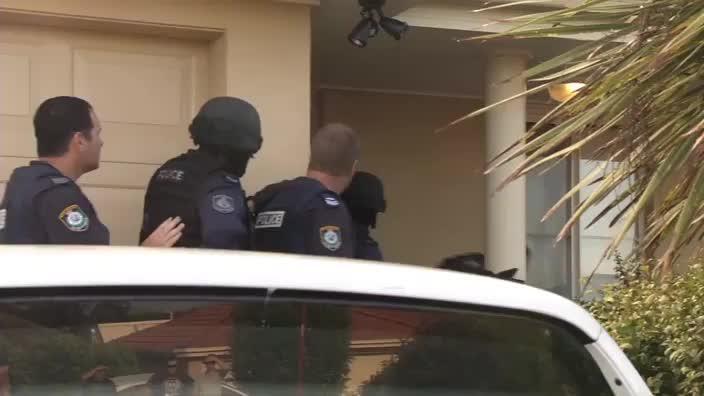
“We are aware of terror intelligence. We don’t want to see a nexus between terrorism and organised crime,’’ Keenan said.
“They recruit from the same pool. Some will do stuff that Australians won’t do. More brutal than the traditional bikie with a high propensity for violence.’’
It’s easier to keep out a bikie who gets his visa revoked when he’s already overseas.
But that doesn’t always happen, so bikies are targeted on Australian soil.
If they’re not in custody, they can be taken to immigration detention — at Villawood, and Maribyrnong, and sometimes to Christmas Island.
The Australian Government sometimes has to charter flights to take them there, as commercial airlines occasionally refuse to fly them.
The cost is high, but Dutton says it’s money well spent.
“Ideally they should go from jail to the plane but some may still be out in the community,’’ he said.
“It’s worth every cent — it’s the best money Australia will ever spend.
“There is no doubt in my mind it is making Australia a safer place.’’
Dutton, a ex-Queensland police officer who worked for a time in the sex offenders squad bringing rapists and paedophiles to justice, says booting out criminals is “incredibly satisfying work.’’
“It’s rewarding work, removing someone who is selling drugs or sexually assaulting children. You’re saving future victims,’’ he said.
He recalls the impact sex offenders had on young victims, saying: “the cases, the stories, the young boys and girls, it stays with you.
“I’m now in a position to prevent that misery taking place and that makes it a good day in the office.’’

